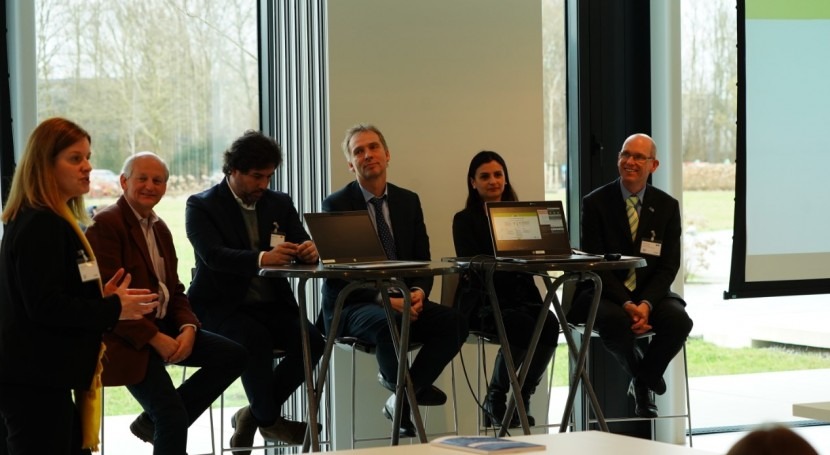On 29th January 2020, the Working Group ‘Water Security’ organised a workshop on Quantitative Assessment of Water Security. The workshop was hosted by KWR Water Research Institute in the Netherlands. The co-leaders of the Working Group, Jan Hofman (University of Bath and KWR) and Blanca Antizar (Isle Utilities) chaired the day. Over 20 participants from different destinations in Europe came to Nieuwegein to join the workshop.
Water Security is a complex concept and its definition is ambiguous; it is about the availability of water for different purposes with qualities that are fit-for-purpose. Water Security includes water supply and sanitation water for agriculture and industry, protection of life of people and property against water related disasters and water for ecosystems and biodiversity; all taking into account socio-economic considerations.
The workshop was focused on developing a methodology for the assessment of water security. Can we develop performance indicators for assessing the level of water security? These indicators would enable a proactive approach for improving Water Security at different levels, from local to global. It is envisaged that this new methodology and set of performance indicators would help to identify challenges, leading to an incentive for improvement. It is acknowledged that because water security is a complex concept and its definition is ambiguous, creating an assessment framework is a difficult task that requires input from many key stakeholders.
For the workshop, the Working Group was able to line up a great panel of high level keynote speakers from key global organisations working on water security. The first presentation was given by the economist Gonzalo Delecamara from the IMDEA institute in Madrid. He is also Cluster Leader on the ‘Value of Water’ programme of Water Europe. In his presentation he put Water Security in an economic perspective and he connected water security to other economic fields and drivers. He gave excellent examples on water for agriculture and for mining, showcasing in a thought-provoking manner the relation of water with other sectors of the economy. The second presentation was given by Kees van Leeuwen of KWR. He emphasised the importance of considering political goals in assessment frameworks, using the City Blueprint Approach and the recent SDG6 assessments, developed by him and his team. Oriana Romano, Head of the Water Governance and Circular Economy Unit of OECD, presented her view on the importance of good water governance, as water challenges are often caused by a lack of good governance. The water governance framework developed by the OECD is a great tool for analysing and development of water governance capacity. She illustrated this with a review of sinking cities and deltas. The fourth keynote was given by Guiseppe Arduino and Maud Berthelot of UNESCO. They explained the 8th Intergovernmental Hydrology Programme, aiming at water security at a local, regional and global scale. They also showcased the project of KWR and UNESCO, implementing the City Blueprint Methodology in six African cities. Finally, Hans Stielstra, Deputy-Director of the Water Unit of European Commission (DG-Environment), provided an overview on how the European water directives contributed to water security in Europe. His conclusion was that the directives broadly fit the goal for achieving water security, but more work is needed in specific cases. It is foreseen that the new European Green Deal will help to accelerate further sustainable development in Europe, including water, which is supported by a Sustainable Europe Investment Plan.
During the panel discussion moderated by Blanca Antizar, the complexity of Water Security was further underlined, as were the wider connections with other sectors such as agricultural and industrial and the general economic development. It was mentioned that already some assessment methodologies are available and the panel considered it important to investigate how these assessments are implemented and whether they can form the basis for further development. A key item was the actual application of a Water Security assessment framework. Often political leaders develop long-term goals as an incentive for improvement, but in many cases the actual concrete actions to achieve them are missing, as well as the metrics to determine if they have been achieved or data availability might be an issue. The Water Europe ‘Water Security’ Working Group will incorporate these conclusions in the follow-up from the day.
The afternoon programme included interactive sessions where the participants could contribute to the development of indicators for evaluating water security. The break-out groups were aligned along the main themes of water security: availability of water, biodiversity and ecosystems, protection against water-related disasters and socio-economic factors.
The afternoon was closed with a presentation of Avelino Gonzalez-Gonzalez (European Commission, DG-RTD) on the available instruments for funding research and innovation. He gave an overview of open calls in the Horizon 2020 programme that relate to Water Security. This included a new call under development to connect to the new European Green Deal. He also gave insight in the setup of the new framework programme Horizon Europe.
The results of the workshop will be used for developing a white paper, a task the Working Group ‘Water Security’ has set for itself. The importance of the white paper is to put ‘Water Security’ on the agenda for the future. What initiatives are taken to assess water security? How will they be used to provide guidance on the development of water governance and a pro-active approach for improving water security? Where are gaps in knowledge requiring further research? The answers to these questions are important to deliver a Water Smart Society and for the positioning of the European water sector around the Green Deal.
Finally, water security is of global importance. The water crisis and several water-related risk areas, such as biodiversity and climate change, are for a number of years in the top-5 risks identified by the World Economic Forum. Water security is an urgent and extremely important issue.
Jan Hofman and Blanca Antizar
Copies of the keynote presentations can be downloaded here: https://drive.google.com/open?id=1kiC8HadBhfKc4glRFA8Pu9soNnW03hor


















